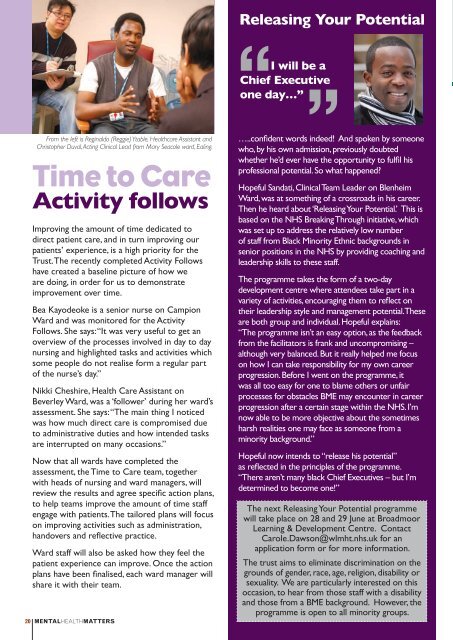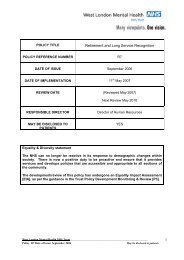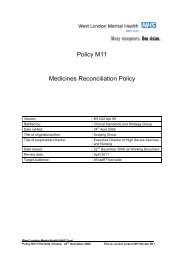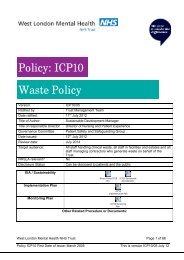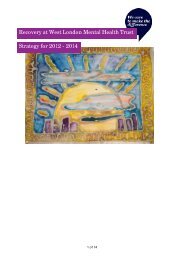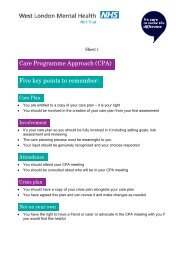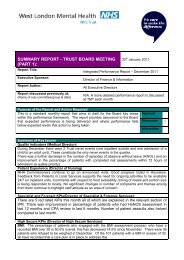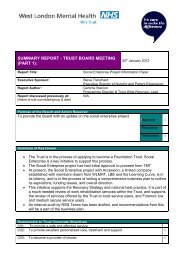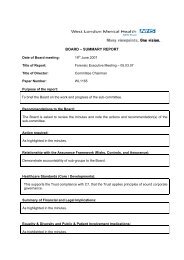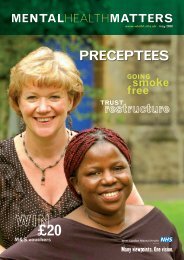MHM March 2010 - West London Mental Health NHS Trust
MHM March 2010 - West London Mental Health NHS Trust
MHM March 2010 - West London Mental Health NHS Trust
Create successful ePaper yourself
Turn your PDF publications into a flip-book with our unique Google optimized e-Paper software.
From the left is Reginaldo (Reggie) Ytable, <strong>Health</strong>care Assistant andChristopher Duval, Acting Clinical Lead from Mary Seacole ward, Ealing.Time to CareActivity followsImproving the amount of time dedicated todirect patient care, and in turn improving ourpatients’ experience, is a high priority for the<strong>Trust</strong>. The recently completed Activity Followshave created a baseline picture of how weare doing, in order for us to demonstrateimprovement over time.Bea Kayodeoke is a senior nurse on CampionWard and was monitored for the ActivityFollows. She says: “It was very useful to get anoverview of the processes involved in day to daynursing and highlighted tasks and activities whichsome people do not realise form a regular partof the nurse’s day.”Nikki Cheshire, <strong>Health</strong> Care Assistant onBeverley Ward, was a ‘follower’ during her ward’sassessment. She says: “The main thing I noticedwas how much direct care is compromised dueto administrative duties and how intended tasksare interrupted on many occasions.”Now that all wards have completed theassessment, the Time to Care team, togetherwith heads of nursing and ward managers, willreview the results and agree specific action plans,to help teams improve the amount of time staffengage with patients. The tailored plans will focuson improving activities such as administration,handovers and reflective practice.Ward staff will also be asked how they feel thepatient experience can improve. Once the actionplans have been finalised, each ward manager willshare it with their team.”Releasing Your PotentialI will be aChief Executiveone day…””…..confident words indeed! And spoken by someonewho, by his own admission, previously doubtedwhether he’d ever have the opportunity to fulfil hisprofessional potential. So what happened?Hopeful Sandati, Clinical Team Leader on BlenheimWard, was at something of a crossroads in his career.Then he heard about ‘Releasing Your Potential.’ This isbased on the <strong>NHS</strong> Breaking Through initiative, whichwas set up to address the relatively low numberof staff from Black Minority Ethnic backgrounds insenior positions in the <strong>NHS</strong> by providing coaching andleadership skills to these staff.The programme takes the form of a two-daydevelopment centre where attendees take part in avariety of activities, encouraging them to reflect ontheir leadership style and management potential. Theseare both group and individual. Hopeful explains:“The programme isn’t an easy option, as the feedbackfrom the facilitators is frank and uncompromising –although very balanced. But it really helped me focuson how I can take responsibility for my own careerprogression. Before I went on the programme, itwas all too easy for one to blame others or unfairprocesses for obstacles BME may encounter in careerprogression after a certain stage within the <strong>NHS</strong>. I’mnow able to be more objective about the sometimesharsh realities one may face as someone from aminority background.”Hopeful now intends to “release his potential”as reflected in the principles of the programme.“There aren’t many black Chief Executives – but I’mdetermined to become one!”The next Releasing Your Potential programmewill take place on 28 and 29 June at BroadmoorLearning & Development Centre. ContactCarole.Dawson@wlmht.nhs.uk for anapplication form or for more information.The trust aims to eliminate discrimination on thegrounds of gender, race, age, religion, disability orsexuality. We are particularly interested on thisoccasion, to hear from those staff with a disabilityand those from a BME background. However, theprogramme is open to all minority groups.outsideinDirector of Communications, Lucy McGeeThe enemy withinIn a previous life, I workedfor a HR consultingfirm. We had phrases todescribe the attributesmanagers operating in a complex environment neededto possess to be successful. One of my favourites was,‘Tolerance of Ambiguity’. It’s something that comes inhandy when things aren’t black and white, or all goodor all bad - but, rather, a bit of each, in unexpectedways. It’s especially useful when people are neithercompletely friend, nor totally foe.We’re certainly going to need our tolerance ofambiguity as we try to move into a more pro-activeapproach to press coverage about mental health.Recently we’ve seen media interest in Broadmoorintensify to what has sometimes felt like obsession.And yet, we’re developing good relations with someof the same papers’ senior staff who are supportiveof helping us promote the anti-stigma agenda andan understanding of the suffering often involved inmental illness.There’s such a worldof difference betweenhow the press could bereflecting mental healthcare and how somepapers do it now. Sadly,this is perpetuatedbecause a very few staffare lining their pockets by selling stories about patientsto the tabloids. So whilst we’re trying to get informativeletters and case studies and success stories publishedon the one hand, we’re busy trying to protect patientprivacy and parry criticism of their being allowed basichuman rights on the other. What puzzles me is whysuch people ever come to work in a hospital...........................................................................................Clinical nuggetsAn impressive new website, developed by The Instituteof Psychiatry, SLaM and Rethink is doing great things topromote awareness and understanding of a range of mentalillnesses. Among the nuggets of information you can find onwww.mentalhealthcare.org.uk is the fact that black peopleliving in England stand a far greater chance of developingschizophrenia or bipolar disorder than white people. Nothingthat our clinical staff didn’t know already, maybe. But thescale of it is frightening. Research shows that people of blackAfrican descent are six times more likely to develop bothillnesses, and African-Caribbean people are nine times morelikely to develop schizophrenia and eight times more likely todevelop bipolar disorder than their white contemporaries.But - and here’s the punch line - studies in Jamaica, Trinidadand Barbados have shown black people living there are nomore likely to develop psychosis than white people livingin England. If you wanted evidence that social exclusion andstress play a part in the development of psychosis, here it is.National stats show that black people are more likely to bepoor, unemployed, and living alone. It’s reassuring to hear PhilHope talk about new social care policies if only the money isthere to deliver them...........................................................................................One small step at a timeIn recent days we’re finding that there is a constructiveway to work with even the historically ‘unfriendly’elements of the press. It’s all about keeping our eyeson the big prize – educating the public about mentalhealth, its treatment and its consequences. If we havea few core messages that we keep drumming homein any opportunity that presents itself, we can makean impact through attrition, as so many mental healthcharities and other bodies are doing.Our long term agenda is anti stigma in all aspects ofour service while recognising that Broadmoor will bethe biggest challenge because of the extreme nature ofsome of the index offences. Recent coverage of someof Broadmoor’s young patients using DJ equipmentwas particularly distressing to our patients and theirfamilies. The mother and grandmother of one of themwere moved to write to me, asking us to please takeissue with the piece. Though the PCC could not findenough evidence to support a challenge the paper itselfagreed to print a letter which presented a different viewfrom the one they often seem to promote. This talkedabout the need for the public to understand that mentalillness is like any other illness - deserving of care andcompassion. One small step at a time …Meantime, if you have any other ideas as to where weshould be targeting our approach and indeed, possiblecontent – please do let us have them! Email your ideasto communications@wlmht.nhs.uk.20 MENTALHEALTHMATTERS MENTALHEALTHMATTERS 21


